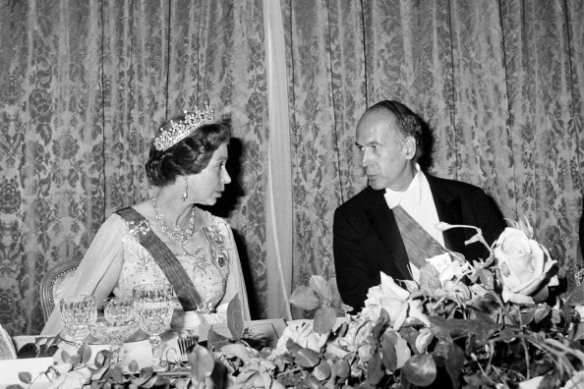Boyfriend sometimes has trouble with time. And when I say sometimes, I actually mean always. Not with telling time, but with keeping good time. If he tells you he’s going to see you at three, he’ll probably show up at a quarter to four. If we’re driving to San Francisco to meet someone, and are stuck in traffic on the Bay Bridge at seven in the evening, he’ll call the person and tell her/him that we’re going to be there in less than ten minutes. If you’ve ever lived in the Bay Area, you know that’s a straight faced lie.
Of course, when you’ve known him for a while you begin to calibrate your expectations. An old friend of ours who usually ends up planning restaurant outings has learned to tell him she’s reserved a table at half past seven, when the reservation actually starts at eight. When I’m supposed to meet him at his office, I call him just as I’m stepping out of the house, and tell him I’m already on the train. Heck, sometimes I even tell him I’m already two stations down. Boyfriend lives in a timezone of his own choosing, and it’s a different one every day.
Last week I made plans for a movie, and asked Boyfriend if he was interested. “Great, I’ll be there at seven,” he declared, face beaming with sincerity. I rolled my eyes. “Seven in which time zone? UTC -10? -12?” I got the following response:
“Did you know the US – and most English-speaking parts of the world after them – got around the acronym ‘UTC’ by putting a comma between time and coordinated?”
That really doesn’t answer my question.
So anyway.
‘UTC’, as most people probably know, is the acronym for Coordinated Universal Time, the primary time standard according to which time zones are divided and clocks are set the world over. Before UTC came about there was GMT – Greenwich Mean Time. In the late eighteenth and early nineteenth century the English Astronomer Royal (yes, there was such a thing), Nevile Maskelyne, did some serious astronomical work on the distance of the moon from the Earth, based on the meridian that passed through the Royal Observatory in Greenwich, England. His work is credited with having made the Greenwich meridian the universal point of reference – the Prime Meridian. And since Great Britain was also the world’s leading maritime force then, it only made sense that all time be calculated in relation to this Prime Meridian. So at the International Meridian Conference in 1884, GMT was declared the universal standard time.
But by the mid-twentieth century scientists were able to calculate the Earth’s rotation more accurately, and decided that GMT wasn’t sharp enough. In the 1960s a more accurate method, Coordinated Universal Time, was adopted by the international community. Of course, you’re probably wondering why the acronym is UTC when the expansion is Coordinated Universal Time, which shortens to CUT, right? The reason is quite simple. It’s because the British and the French can’t agree on anything.
Back when Coordinated Universal Time was being adopted, the British (and most other English-speaking parts of the world) wanted the acronym CUT. But the French expansion for the term is Temps Universel Coordonné, so they wanted TUC. Both countries were adamant about their position, and the fight went on for a while. So in 1970 the International Telecommunication Union, which had had enough of this petty nonsense by then, decided it was time to declare a uniform abbreviation for all languages, and that (more importantly) neither Britain nor France would get what they wanted. They voted on the acronym UTC. Britain and France were just going to have to deal with it.

“I told you Lisette, we should have just adopted the French term…”
“Oh, come on, Valéry. If you hadn’t been so stubborn, it would all be ok. And DO NOT call me Lisette again.”
(Photo credit ARCHIVE/AFP/GettyImages)
Now, UTC doesn’t actually expand into anything that makes sense in either language. Universel Temps Coordonné is just incorrect, as is Universal Time Coordinated. However, the US decided to get smart and put a comma between ‘Time’ and ‘Coordinated’. And voila!:
The acronym and expansion both make sense, and the comma has been adopted by most English-speaking countries (that care about this matter). Everyone wins.
Except France.

Oh, dear. (Image source)


